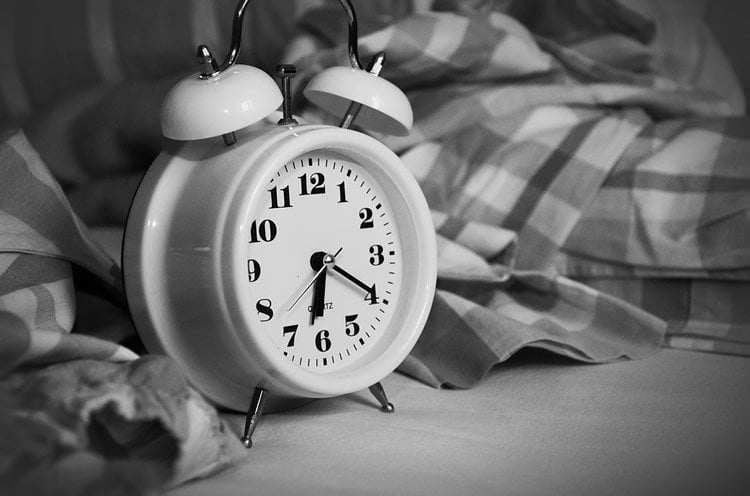Summary: A new study reports teens who sleep for less than 6 hours per night are at greater risk of mental health issues, substance abuse, accidents and other risk taking behaviors.
Source: Brigham and Women’s Hospital.
Adolescents require 8-10 hours of sleep at night for optimal health, according to sleep experts, yet more than 70 percent of high school students get less than that. Previous studies have demonstrated that insufficient sleep in youth can result in learning difficulties, impaired judgement, and risk of adverse health behaviors. In a new study, researchers at Brigham and Women’s Hospital examined a national data sample of risk-taking behaviors and sleep duration self-reported by high school students over eight years and found an association between sleep duration and personal safety risk-taking actions. Results are published in a JAMA Pediatrics research letter on October 1.
“We found the odds of unsafe behavior by high school students increased significantly with fewer hours of sleep,” said lead author Mathew Weaver, PhD, research fellow, Division of Sleep and Circadian Disorders, Brigham and Women’s Hospital. “Personal risk-taking behaviors are common precursors to accidents and suicides, which are the leading causes of death among teens and have important implications for the health and safety of high school students nationally.”
Compared to students who reported sleeping eight hours at night, high school students who slept less than six hours were twice as likely to self-report using alcohol, tobacco, marijuana or other drugs, and driving after drinking alcohol. They were also nearly twice as likely to report carrying a weapon or being in a fight. Researchers found the strongest associations were related to mood and self- harm. Those who slept less than six hours were more than three times as likely to consider or attempt suicide, and four times as likely to attempt suicide, resulting in treatment. Only 30 percent of the students in the study reported averaging more than eight hours of sleep on school nights.
The Youth Risk Behavior Surveys are administered biannually by the U.S. Centers for Disease Control and Prevention (CDC) at public and private schools across the country. Researchers used data from 67,615 high school students collected between 2007 and 2015. Personal safety risk-taking behaviors were examined individually and as composite categories. All analyses were weighted to account for the complex survey design and controlled for age, sex, race, and year of survey in mathematical models to test the association between sleep duration and each outcome of interest.

“Insufficient sleep in youth raises multiple public health concerns, including mental health, substance abuse, and motor vehicle crashes,” said senior author Elizabeth Klerman, MD, PhD, director of the Analytic Modeling Unit, Division of Sleep and Circadian Disorders, Brigham and Women’s Hospital. “More research is needed to determine the specific relationships between sleep and personal safety risk-taking behaviors. We should support efforts to promote healthy sleep habits and decrease barriers to sufficient sleep in this vulnerable population.”
Funding: Authors were supported in part by the NIH National Heart, Lung, and Blood Institute (NHLBI) Training Program in Sleep, Circadian and Respiratory Neurobiology (T32 HL007901) and NHLBI award number F32 HL134249 (MDW); NIH National Institute of General Medical Sciences (NIGMS) R01GM105018, National Aeronautics and Space Administration (NASA) NNX14AK53G, NNX15AC14G and NNX15AM28G, National Institute for Occupational Safety and Health (NIOSH) R01OH010300, and NIH NHLBI U01HL111478 (LKB); NIH National Institute of Nursing Research (NINR) K99NR017416 and New York University Clinical and Translational Science Award UL1TR001445 (SKM); and NIH NHLBI K24HL105664, R01HL128538, and R01HL114088, NIH NIGMS R01GM105018, NIH National Institute of Aging P01AG009975, and NIH National Institute of Child Health and Human Development (NICHD) R21HD086392 (EBK).
Source: Elaine St. Peter – Brigham and Women’s Hospital
Publisher: Organized by NeuroscienceNews.com.
Image Source: NeuroscienceNews.com image is in the public domain.
Original Research: Abstract for “Dose-Dependent Associations Between Sleep Duration and Unsafe Behaviors Among US High School Students” by Matthew D. Weaver, PhD; Laura K. Barger, PhD; Susan Kohl Malone, PhD, RN, NCSN; Lori S. Anderson, PhD, RN, CPNP-PC, NCSN; and Elizabeth B. Klerman, MD, PhD in JAMA Pediatrics. Published October 1 2018.
doi:10.1001/jamapediatrics.2018.2777
[cbtabs][cbtab title=”MLA”]Brigham and Women’s Hospital”Insufficient Sleep Associated with Risky Teen Behavior.” NeuroscienceNews. NeuroscienceNews, 1 October 2018.
<https://neurosciencenews.com/sleep-teen-behavior-9938/>.[/cbtab][cbtab title=”APA”]Brigham and Women’s Hospital(2018, October 1). Insufficient Sleep Associated with Risky Teen Behavior. NeuroscienceNews. Retrieved October 1, 2018 from https://neurosciencenews.com/sleep-teen-behavior-9938/[/cbtab][cbtab title=”Chicago”]Brigham and Women’s Hospital”Insufficient Sleep Associated with Risky Teen Behavior.” https://neurosciencenews.com/sleep-teen-behavior-9938/ (accessed October 1, 2018).[/cbtab][/cbtabs]
Abstract
Dose-Dependent Associations Between Sleep Duration and Unsafe Behaviors Among US High School Students
Youths in America are sleeping less than ever before. More than 70% of high school students average less than 8 hours of sleep, falling short of the 8 to 10 hours that adolescents need for optimal health. Insufficient sleep negatively affects learning and development and acutely alters judgment, particularly among youths.3 We estimated associations between sleep duration and personal safety risk-taking behaviors in US high school students.







